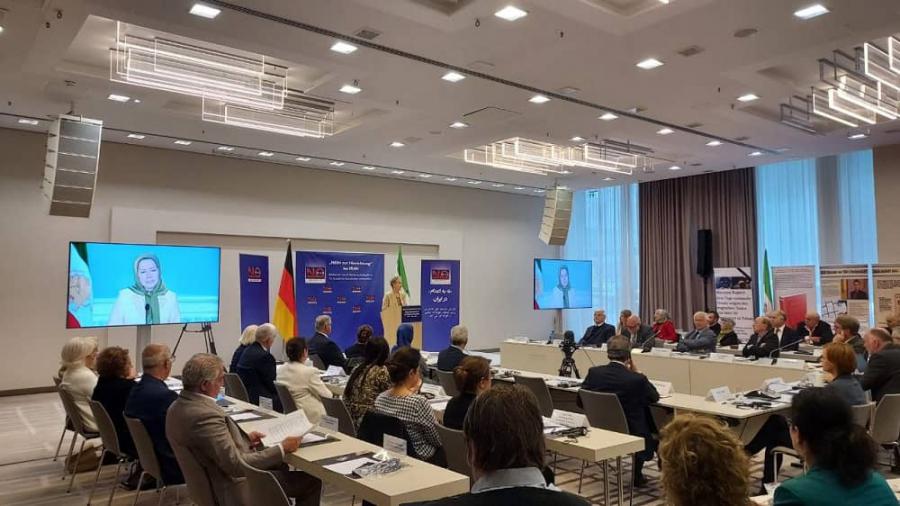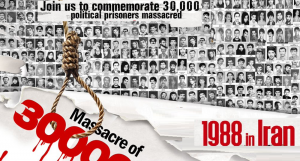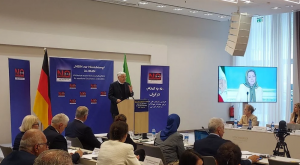
(Video) Berlin Conference Calls for International Action Against Iran’s Human Rights Abuses
Key recommendations included designating the IRGC as a terrorist organization, enforcing international sanctions, and recognizing the 1988 massacre as genocide.
PARIS, FRANCE, October 5, 2024 /EINPresswire.com/ -- The National Council of Resistance of Iran (NCRI) Foreign Affairs Committee in an article published that a significant conference held in Berlin brought together politicians, legal experts, and human rights advocates to address the increasing human rights violations and mass executions occurring in Iran.
Organized by the German Section of the Exiled Iranian Communities in Europe and the German Solidarity Committee for a Free Iran (DSFI), the event called for international action against the Iranian regime, highlighting its long-standing record of repression.
Key speakers, including members of the German Bundestag, former ministers, and legal experts, called for the international community to hold the Iranian regime accountable for systematic human rights abuses. The conference also emphasized the necessity of supporting the Iranian opposition in their fight for freedom and democracy.
The conference raised urgent concerns over the continued rise in executions, particularly under the newly appointed president of Iran, Masoud Pezeshkian. Reports indicated that at least 191 prisoners, including women and political prisoners, were executed since his inauguration.
Amnesty International data cited that 74% of all recorded executions globally in 2023 were in Iran, a trend that has worsened with the new government.
Multiple speakers, including members of the German Bundestag and former federal ministers, called for the establishment of special tribunals to hold Iranian regime leaders accountable for systematic human rights abuses.
Professor Javid Rehman, in his landmark report as the outgoing UN Special Rapporteur on the situation of human rights in Iran, classified the mass executions of political prisoners in 1988 as “crimes against humanity” and “genocide.”
The conference revisited the mass executions of 1988, where an estimated 30,000 political prisoners, 90% of whom were members and supporters of the People’s Mojahedin Organization of Iran (PMOI/MEK), were massacred on orders from Ruhollah Khomeini, the founder of the Iranian theocracy.
This mass execution remains a dark chapter in Iranian history, with many perpetrators still holding positions of power today.
Carsten Müller, Member of the German Bundestag
In his speech, Carsten Müller condemned the ongoing executions in Iran, expressing grave concern over the regime’s brutal actions against political dissidents and the opposition. He warned that the Iranian regime’s influence extends beyond its borders, even into Western countries.
“We are witnessing horrific human rights violations, with executions becoming routine in Iran. The regime is not only persecuting its people but also infiltrating Western countries by installing so-called ‘Iran experts’ in influential positions,” Müller said.
He also drew attention to the regime’s backing of militant groups, such as Hezbollah, warning that “these forces, instigated and funded by the Mullahs in Tehran, could drag the entire world into conflict.”
Mrs. Maryam Rajavi, President-elect of the National Council of Resistance of Iran (NCRI)
Mrs. Maryam Rajavi, speaking via video from Paris, criticized the long-standing policy of appeasement toward the Iranian regime by Western nations. She highlighted two major misconceptions that have enabled the government to maintain power.
“For years, the Iranian regime has manipulated the West with two lies: first, that the regime will eventually moderate, and second, that there is no viable alternative to the regime,” Mrs. Rajavi stated. “Today, many European nations, including Germany, are starting to realize that this regime will not change.
Verbal condemnations of the regime, while ignoring the organized resistance, achieve nothing.” Mrs. Rajavi also emphasized that “to stop executions and repression, the Mullahs’ regime must be removed, and the Iranian people must be supported in their fight for freedom.”
Herta Däubler-Gmelin, Former German Minister of Justice
Herta Däubler-Gmelin stressed the importance of Javid Rehman’s report on Iran, which documents severe human rights abuses, including mass executions. She called for more recognition of these atrocities at an international level, particularly within the German Bundestag.
“The report by Professor Javid Rehman is horrifying and crucial. It documents massacres, murders, and rapes.
These crimes cannot go unpunished,” she said. Däubler-Gmelin called on the Bundestag to formally recognize the report and take steps to ensure that the perpetrators of these crimes are held accountable. “It is unacceptable that the judiciary in Iran has become a tool for the regime, ordering torture and carrying out brutal executions.”
Franz Josef Jung, Former German Minister of Defense
Franz Josef Jung pointed out the regime’s use of executions to maintain control and suppress dissent, stressing that the international community must not remain passive.
He reiterated that the current president of the Iranian regime, Masoud Pezeshkian, has done nothing to curb these executions, with over 100 individuals executed in August alone.
“The executions, especially of political dissidents, are a tool for the regime to maintain fear and control,” Jung said. “This regime is not only a threat to the Iranian people but a global menace, supplying drones to Russia for use in Ukraine and supporting terrorist activities worldwide.”
Ambassador Joachim Rücker
Ambassador Rücker called for the immediate classification of the Islamic Revolutionary Guard Corps (IRGC) as a terrorist organization within the European Union, emphasizing the regime’s global threats.
Professor Javid Rehman’s report was a cornerstone of the conference, documenting the 1988 massacre where 30,000 political prisoners were executed on the orders of Ruhollah Khomeini. His report classified these acts as genocide and crimes against humanity.
“The mass executions of 1988, which resulted in the deaths of 30,000 political prisoners, constitute genocide. The perpetrators of these crimes continue to hold powerful positions in the Iranian government today,” Rehman’s report said.
Witnesses and Survivors
Akbar Bandali, a survivor of the 1988 massacre, provided a firsthand account of the brutal executions, recounting nights when hundreds of prisoners were executed. “In my first night in prison, I witnessed the execution of 140 people. These mass executions happened twice a week,” Bandali recalled.
Vida Niktalean, a relative of 1988 massacre victims, shared the personal toll these executions have taken on families. “They told us my cousin Hamid was executed shortly after his wrongful arrest. They even demanded we pay for the bullets used in his execution,” she tearfully recounted.
Ingrid Betancourt, Former Colombian Senator
Ingrid Betancourt, a former hostage of a terror group in Colombia, highlighted the parallels between her own experiences and the Iranian opposition’s struggle against the regime.
She noted how the Iranian regime attempts to discredit the opposition, particularly the People’s Mojahedin Organization of Iran (PMOI/MEK), by labeling them as terrorists.
“I was shocked when I first heard the Iranian regime calling the PMOI terrorists. I had been a victim of a similar group in Colombia, so my alarm bells rang.
But after investigating, I realized this was a manipulation tactic by the Iranian regime to discredit the opposition,” Betancourt explained. She condemned the Iranian regime’s “psychological warfare” against the MEK.
She emphasized that the real terrorists are the Mullahs in power. “We know that to stop the torture and executions in Iran, we must rid the country of the Mullahs. The only way to achieve this is to support the Iranian people and the MEK, who are fighting for freedom.”
Günter Nooke, Former Human Rights Commissioner of Germany
Günter Nooke emphasized the ongoing atrocities committed by the Iranian regime and criticized the West’s failure to hold the regime accountable, particularly highlighting the complicity of some Western countries due to economic interests.
“The massacre of political prisoners in Iran, especially the atrocities committed against the MEK, is a glaring example of impunity. Yet, Western nations, including Germany, have turned a blind eye due to economic interests,” Nooke said.
He called on the German government to take a more active role in holding the Iranian regime accountable. “The recent report by Professor Javid Rehman offers an opportunity for Germany to push for stronger measures. We must help bring the perpetrators to justice instead of seeking new business deals.”
Martin Patzelt, Former Member of the German Bundestag
Martin Patzelt, a former member of the German Bundestag, focused on the Iranian regime’s campaign to discredit the MEK and the broader Iranian resistance. He expressed frustration over how disinformation had even infiltrated German institutions.
“The Iranian regime’s disinformation campaign against the PMOI has been so effective that it even reached some of my colleagues in the Bundestag,”
Patzelt remarked. “We must be clear that the PMOI, alongside the National Council of Resistance of Iran (NCRI), has been fighting for freedom, democracy, and human rights from the start.” He also highlighted the resilience of the Iranian opposition, despite the heavy price they have paid: “The PMOI has sacrificed 120,000 of its members and supporters in the fight for freedom, yet the regime continues to vilify them. We must resist this narrative and stand with those who truly represent the future of a free Iran.”
Professor Wolfgang Schomburg, Former Judge at the International Criminal Court
Professor Wolfgang Schomburg stressed the importance of establishing an international tribunal to hold the Iranian regime accountable for its crimes, particularly the 1988 massacre of political prisoners. He described the regime’s judicial system as nothing more than a tool for repression.
“The 1988 massacre was not just a crime; it was systematic murder carried out under a religious fatwa. We cannot treat this as irregular executions it was sheer murder, and the judges who carried out these orders must be held accountable,” Schomburg declared. He called on the international community, particularly Germany and the European Union, to lead efforts to set up an international tribunal.
“It is time for an international mechanism to bring these criminals to justice. The Iranian people deserve truth, justice, and accountability.”
Nina Pesian, Representative of the German-Iranian Society
Nina Pesian, representing the German-Iranian Society, spoke about the continued suffering of the Iranian people, especially the families of those who were executed or imprisoned by the regime. She called for more support from the international community to end the oppression in Iran.
“Our families in Iran live in constant fear, facing daily threats and repression,” Persian stated. “The regime continues to execute those who stand up for their rights, as we have seen recently with three protesters sentenced to death.
Our movement fights for a democratic and secular Iran, and we are fully behind Maryam Rajavi’s ten-point plan, which offers a path toward freedom and justice.” She urged the conference attendees to support the campaign to end executions in Iran and to advocate for the rights of the Iranian people. “Every bit of support will help bring an end to the suffering, repression, and torture.”
The conference ended with a unified call for immediate action from the international community. The speakers urged the West to stop appeasing the Iranian regime and to support the Iranian opposition, particularly the NCRI, in their fight for a free and democratic Iran.
Key recommendations included designating the IRGC as a terrorist organization, enforcing international sanctions, and recognizing the 1988 massacre as genocide.
The event sent a powerful message of solidarity with the Iranian people and underscored the importance of holding the Iranian regime accountable for its ongoing human rights violations.
If you wish to receive the NCRI weekly Newsletter, please use the following link to subscribe: https://bit.ly/3SMgEla.
Shahin Gobadi
NCRI
+33 6 61 65 32 31
email us here
Franz Josef Jung," the regime’s use of executions to maintain control and suppress dissent, stressing that the international community must not remain passive".
Distribution channels:
Legal Disclaimer:
EIN Presswire provides this news content "as is" without warranty of any kind. We do not accept any responsibility or liability for the accuracy, content, images, videos, licenses, completeness, legality, or reliability of the information contained in this article. If you have any complaints or copyright issues related to this article, kindly contact the author above.
Submit your press release




